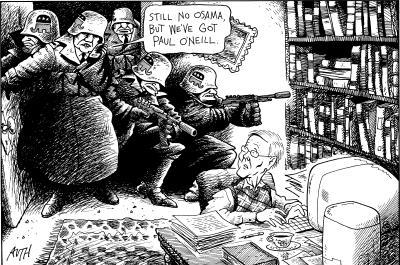|
Issue Date: January 23, 2004 'Centrist' disappears in O'Neill's portrayal The “news” from Ron Suskind’s new book The Price of Loyalty: George W. Bush, the White House, and the Education of Paul O’Neil was hardly man-bites-dog stuff. O’Neill, who has since backpedaled a little from his opening salvos in TV interviews, claimed in print that from Day 1 key policymakers in the administration were focused on removing Saddam Hussein from power. Any sentient observer of the administration already knew that. The means were a matter of some dispute -- Sept. 11 provided the cover administration hawks needed to ignite a war -- but the ends were never questioned. In fact, regime change was a stated goal of the Clinton administration.
The second revelation of the book is that the president is not particularly engaged, not especially curious, and is surrounded by partisan ideologues who insulate him from competing viewpoints. What didn’t make the news was, as is often the case, more revealing than what did. Two examples: First, Bush’s outright rejection of the Kyoto Protocol on global climate change resulted from a maneuver engineered by Vice President Dick Cheney. Next, Bush and his inner circle -- out of fear of alienating their “base” -- rejected the efforts of Federal Reserve Board Chairman Alan Greenspan and his ally O’Neill to bring real accountability to corporate CEOs. O’Neill, the book makes abundantly clear, never quite fit in at the Bush administration’s highest circles. He was an old-school Republican -- more George I than George II. For example, he held to the belief that the federal government should not run huge deficits and that it was a bad idea to squander a $5.6 trillion surplus on tax cuts that disproportionately aided the wealthy. Early on in the administration, Suskind reports, O’Neill teamed with then-EPA Administrator Christie Whitman in an effort to form a coherent U.S. policy on global warming. With little guidance from the president, Whitman got out front. “One pronouncement she endorsed was that the G-8 nations would ‘strive to reach agreement’ in July [2001] in Bonn at the next set of talks on the Kyoto Protocol.” O’Neill told Suskind: “It’s an area where you can fund research and demonstration work and get people together to listen to their ideas and hear what they know. Here, with so much at stake, you really can have a rationally based policy that represents what’s good for the people.” The Bush crowd, led by the vice president, were having none of it. Cheney, the administration’s lead person on energy policy, orchestrated a letter to the president from members of Congress who opposed Kyoto. The president, in response, pulled the carpet out from under Whitman and declared Kyoto “an unfair and ineffective means of addressing global climate change concerns.” Meanwhile, amid the Enron and Global Crossing scandals, Greenspan and O’Neill -- a former corporate CEO -- pushed for regulations that would hold CEOs directly responsible for ensuring that their financial statements were accurate. Bush, under pressure from his corporate “base,” chose a lesser course. Perhaps most disturbing in Suskind’s account, however, is a portrayal of a president who doesn’t engage or challenge his advisers, whose ill-informed instincts are only reinforced by a small cadre obsessively driven by the political implications of their decisions. In the Bush White House, Suskind reports, presidential meetings are scripted, lest the president be left to choose between unattractive options. Suskind recounted O’Neill’s impressions: “The president was caught in an echo chamber of his own making, cut off from everyone other than a circle around him that’s tiny and getting smaller and in concert on everything -- a circle that conceals him from public view and keeps him away from the one thing he needs most: honest, disinterested perspectives about what’s real and what the hell he might do about it.” Granted, this is one person’s perception. But O’Neill has a significant resumé in Republican circles, has worked for several administrations and was close to Cheney. Still, the public always wonders, and deserves to know, who’s in charge and what forces are shaping national decisions. The question we’re left with is haunting. Was it possible, O’Neill asked himself, “that the country thought it had elected a centrist when in fact it had empowered an ideologue?” National Catholic Reporter, January 23, 2004 |
